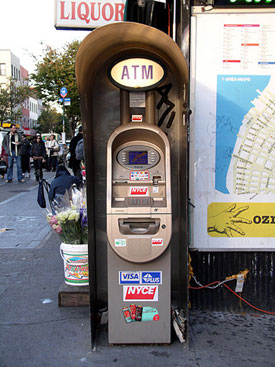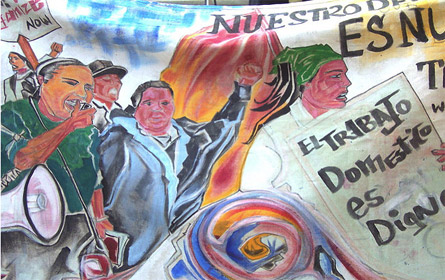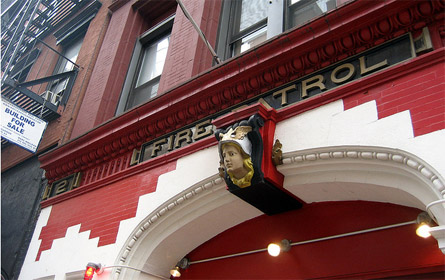Council Cracks Down on Sidewalk ATMs

Getting cash might become a little less convenient.
The City Council approved legislation Wednesday to crack down on illegal ATMs, which saturate city sidewalks, provide a haven for graffiti and pose a security risk for cash-strapped pedestrians, officials said.
Flooding nightlife-laden areas, like the Lower East Side, Williamsburg or either Village, these ATMs have proliferated for more than a decade, council officials said.
But they have done so illegally.
"It really makes them not automatic teller machines," said Council Speaker Christine Quinn. "It makes them asking for trouble machines."
Under the legislation (Intro 257-A) fines for having an illegal ATM on your property could increase 20-fold -- from $250 to $5,000. Mayor Michael Bloomberg plans to sign the bill, which was approved by the council unanimously.
Out of Order
Robert J. Benfatto Jr., the district manager for Community Board 4 in Manhattan, which spans the west side from 14th Street to Midtown, knows these notorious ATMs well.
"There is a sign one after the other, ATM, ATM, ATM," Benfatto said of Ninth Avenue. The Community Board supports the legislation, he added. "[The ATMs] take away from the street space. They are open to crime problems."
Benfatto said the board has also received complaints of identify theft and fraud. Other officials said the ATMs can attract theft.
"It's something that begs criminals to stake it out," said Quinn.
The problem was pointed out across the city -- from Grand Street in Williamsburg to Sixth Avenue in the West Village. These ATMs are only illegal if they are located outside of a store on the sidewalk. The bill will not affect ATMs inside bodegas or bank vestibules.
Council officials could not estimate how many illegal ATMs the city hosts, but a quick survey of any neighborhood shows their prevalence.
A report from Manhattan Borough President Scott Stringer in 2009, which pushed for regulations to discourage their use, found 99 in the East Village -- 70 were between First Avenue and Avenue B alone.
Under the bill, the Department of Transportation will give property owners 30 days to remove the illegal ATM. After that, a property owner can be fined between $2,500 and $5,000 every five days if the ATM is not removed. If the owner racks up unpaid fines of $50,000 over the course of 90 days, the city will seize the ATM.
Officials said the retooled ATM ban would prevent the obstruction of sidewalks and prohibit graffiti. This legislation, said Quinn, would increase New Yorkers quality of life.
Human Rights and Energy Code
The council also unanimously approved legislation (Intro 396-A) to establish guidelines for the Commission on Human Rights to report to the City Council. Currently, the commission must file an annual report with the council, but it is given no deadline or guidance.
The bill will require the commission report to the council by March 1 every year and provide details on complaints, inquiries from the public and outreach efforts.
The council also approved legislation (Intro 343-A) to bring the city's energy code up to date with the 2010 state energy code.
Street Renaming
The council unanimously approved its semi-annual street naming legislation ( Intro 428-A), which ceremonially renames certain corridors and avenues after notable New Yorkers.
Among those named in this round, Det. Omar Edwards, who was the victim of friendly fire in Harlem in 2009, will have a slice of East 123rd Street, and Officer John Scarangella, who was killed in the line of duty, will have a section of Baisley Boulevard named for him in Queens.
Landmark State Law Protecting Domestic Workers Takes Effect

The New York State Domestic Workers Bill of Rights, the first in the United States, becomes law today -- Nov. 29.
By amending the Human Rights Law, Workers Compensation Law and Labor Law, the state government gave the more than 200,000 domestic workers in the metropolitan area -- housekeepers, nannies, home aides -- a package of limited rights and benefits previously denied them.
Limited Protection
The measure provides statutory protections from harassment, mandates for overtime pay, a six-day (or shorter) workweek and three paid vacation days after the first year on the job even if there is only one employee in a household instead of four under prior law. The changes will extend disability benefits to employees who work fewer than 40 hours per week. While the new laws apply to employees who do some work on an ad hoc, or casual, basis, they do not extend to the teenager who baby-sits once in a while or the person hired to clean out closets every spring. The Human Rights Law will prohibit "unwelcome sexual advances," seeking "sexual favors," or verbal and/or physical conduct which tends to be a condition of employment or creates an "intimidating, hostile or offensive work environment."
Overtime pay is defined as one and one-half times the hourly pay over 40 hours; for live-in domestic workers (who may be present to assist elderly or disabled persons day and night), it is 44 hours. In barring a seven-day work week, the Bill of Rights does not require, but does encourage, allowing that that the day off be the worker's Sabbath or day of worship.
The bill of rights protects workers against discrimination on the basis of sex, race, national origin and religion, but does not extend that to some of New York's other protected classes, such as those discriminated against because of age, sexual orientation or marital status. Nor is the Bill of Rights about discrimination in hiring, salary issues or other conditions; it covers only what is specified.
A Change in Attitude
Organizers working with a coalition of non-profit groups fought for paid sick leave or sick days, vacation days and severance pay but won none of those benefits. While they did not succeed in getting their entire agenda passed, the changes do represent some shift in attitudes toward those who work in other people’s homes, almost all of whom are minority women employed at the lowest pay scales, often working under difficult and demeaning conditions. According to Joycelynn Campbell, organizing coordinator for Domestic Workers United, 93 percent of domestic workers are women, 95 percent are women of color and 99 percent are immigrants, mostly from Caribbean and Latin American countries.
The new benefits are minimal compared to those that unions regularly negotiate for their members, and are less than what was sought by the 10-year old, non-profit organization Domestic Workers United. Union membership and collective bargaining are explicitly unavailable to domestic workers. The Bill of Rights requires an investigation into the feasibility of a union being established and recognized by the state Employment Relations Act, which applies to private employment.
According to the domestic workers law, the labor department was to examine and report on whether an employee organization could be formed in accordance with the State Labor Relations Act; how bargaining units could be formed; whether there are issues unique to the domestic work context; and alternative frameworks for collective organization., and the unionizing portion has not been released. So far, the state Department of Labor has not authorized unions for these workers.
A report has, however, been issued rejecting several other demands. In addition to the collective bargaining issues, the legislature directed the Department of Labor to consider sick leave, notice of termination and severance pay. All were rejected.
Getting the Word Out
Whether and how covered employees will be made aware of the protections and benefits without a union may depend in part on the good will of and information provided by their employers. Information on the workers' new rights will be available on Domestic Workers United website. The group is considering using billboards to get the information out.
Enforcement will require workers to file complaints about violations with the state, but it may be that, even when employers are not in compliance, employees will be reluctant to make formal complaints or will remain unaware of their options.
This could be a particular issue for the affected workers who are undocumented immigrants. The legislation does not address them or their employers. Campbell of Domestic Workers United said, "Immigration is not an issue. Our members are not afraid of speaking out. They have been educated about their rights, and these are workers' human rights."
Legal representation is available pro bono through NELA, the National Employment Law Association and today, as law goes into effect, Domestic Workers United will announce the opening of its legal clinic at 1201 Broadway (Suite 807-8) in Manhattan.
A complaint of harassment or abuse filed with the Department of Labor could expose the employer to further filings if they have, for example, not paid unemployment and disability insurance or workers' compensation, as well as state and federal taxes.
Emily Jane Goodman is a New York State Supreme Court Justice
Council and Mayor Clash Over Budget Cuts

The Bloomberg administration released $1.6 billion in proposed budget cuts Thursday that could force lower-income families to pay more for childcare, shut down 20 fire companies at night and reduce the city's workforce by more than 10,000 employees.
The budget reductions were part of an unusual mid-year plan meant to preempt a dismal fiscal outlook next year, said Deputy Mayor Stephen Goldsmith. Beyond the budget revisions announced Thursday, the city still faces a $2.4 billion gap in fiscal year 2012, which starts in July.
"This is really just preparation for a much, much, much more difficult situation in 2012," said Goldsmith, who attributes the city's budget gap to out of control pensions costs. "There are teachers that don’t have their jobs. There are firefighters that are going to have station closings or company closings at night. There are police officers that we would like to hire, which we can't do, because we have this huge pension obligation."
The unusual circumstances and gloomy economic projections, however, did not silence the City Council. Just an hour after the administration released its plan, Council Speaker Christine Quinn stood ready to attack pieces of it.
"CUNY, libraries, after-school programs, those are services that our middle class utilizes every day," Council Speaker Christine Quinn said from her temporary offices across Broadway from City Hall. "We are going to have a voice in what happens," Quinn said.
The council must still determine how it plans to do that. Due to the nuances of the City Charter, the city's legislature is not required to vote on budget revisions unless the administration actually increases spending -- that increase could be as minor as shifting a small amount of money from one agency to another.
The mayor, according to the charter, may cut at will regardless of the council's position.
The Cuts Up Close
Yesterday's cuts are the ninth round of budget reductions in the last three years.
But both officials and watchdogs see the slashes as a necessary evil.
"I think it's a responsible plan," said Carol Kellermann, president of the Citizens Budget Commission. "There will be serious cuts [to the city] like there were last year in the state budget. The mayor is right to try to be prepared."
Over the next 18 months, Mayor Michael Bloomberg has proposed to cut 6,166 teachers at the Department of Education, two thirds of whom would be laid off.
He has proposed to reduce library service by one day and plans on cutting more than 550 positions from the Administration for Children's Services, including some child protective specialist supervisors. This comes just weeks after the Brooklyn district attorney announced an investigation into the death of a 4-year-old Brooklyn girl who had been under ACS watch.
Those cuts in particular caught the attention of advocates.
"We worry that this is the ninth time that we have cut services for children and families," said Stephanie Gendell, associate executive director for policy and public affairs at the Citizens' Committee for Children of New York. "We are worried about the impact on child safety and well being."
The mayor also wants to eliminate 350 civilian positions, through attrition, at the Police Department and increase parking meter rates by at least 20 percent across the city.
At night, staff at 20 fire companies could be reassigned -- effectively shutting down an engine or ladder during those hours. The administration plans to eliminate 15 percent of security guards at city-operated homeless shelters and convert vacant property into privately operated parking lots.
It also proposed to eliminate 2,140 youth summer jobs and reduce after-school care on holidays. The Department of Health and Mental Hygiene will close two tuberculosis clinics and eliminate funding for two school-based health care centers. Even meals at Rikers Island will be thinner -- inmates will receive six slices of bread a day instead of eight.
Several agencies, including the parks, transportation and health departments, plan on negotiating with unions to institute furloughs to save cash.
Overall, about 10,300 employees could lose their jobs, 60 percent of them through layoffs.
The budget modification does not include any new taxes, but it does have fee increases, such as at parking meters.
Quinn said the council recognizes cuts have to be made. But it's a matter of where you make them.
The Council's Priorities
Already, council members are attacking the proposed library cuts, summer youth employment reductions, the slashes at the Administration for Children's Services and at the City University of New York as well as the potential nighttime company closures at the Fire Department. The speaker also took issue with cuts to case management programs for seniors.
Many of these cuts are in programs that consistently place at the top of the council's budget priorities. Year after year, the administration has cut them.
In a normal budget cycle, the council would have its own pot of money to restore its favorite causes. Because these budget cuts are mid-year, the council is left with little more than its voice.
Quinn said the council would propose alternatives and hold a series of hearings on the proposals in December.
Yesterday the speaker suggested eliminating meter collection staffing at the Department of Transportation, which could potentially save $3 million. She also proposed bringing professional development at the Department of Education in house instead of contracting it out. That would save $4 million, she said. Quinn also said the city could cut the public information budget at the Department of Sanitation.
Nonetheless, much of this could be moot if the Bloomberg administration doesn't increase funding in a certain area, triggering a council vote. If no increase occurs, Quinn said, the council would use its bully pulpit to try to do away with some of the proposed slashes.
"We are going to voice our agreement where we agree. We are going to voice our disagreement where we disagree," said Quinn. "And where we disagree and we are going to fight to prevent cuts, we will come forward with alternative cuts, because we recognize we just can't keep spending at the same rate -- even to protect the most vulnerable."
We will see if Bloomberg administration listens.




